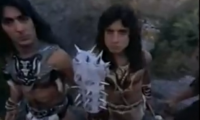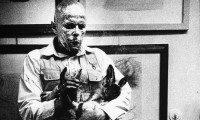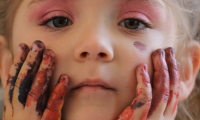archiecomixfan, “Strange Exchange” (Betty & Veronica Double Digest #173, 2009)
When I was eight years old, I asked a hairdresser to cut my hair like Betty Cooper’s. I presented her with an Archie comic as a reference and she said that she would do her best. I’m pretty sure I picked Betty only because she was blonde, like me. When I eventually saw my reflection in the mirror, I was extremely disappointed. I didn’t look like Betty at all. My hair wasn’t yellow, my eyelashes weren’t long and thick, my lips didn’t glisten, and I didn’t have Betty’s figure either.
I think Archie Comics appealed to me at that age because they offered a way into the mysterious, exotic world of dating, high school dances and back-seat make outs but without any danger. The traumas of the Archie characters never seemed to upset the status quo. Every fight or betrayal or insult or dirty trick was quickly forgotten. It was a profoundly reassuring portrait of the teenage life that awaited me.
I liked Riverdale. It’s a quaint, urban, coastal town in the American mid-West which has everything: ponds, mountains, forests, movie studios, milkshake shops, giant shopping malls, several big high schools, extremely snowy winters, ski slopes, tropical beaches. It has wealthy people, a handful of homeless people (at Christmas when they can be helped), sexy foreign exchange students and at least three black people. In Riverdale, teenagers rule. The adults are hapless, neurotic, or irrelevant, never very effective in anything. Look at how they are portrayed in this never-aired live action Archie pilot, especially Mr. Weatherbee, Riverdale High’s principal.
Gene Nelson, “Archie: Unaired TV Pilot” (1964)
Yes, “propinquity” does take care of everything in Riverdale. At the centre of it all is klutzy Archie Andrews whose good intentions always get him into trouble, and who is popular in spite of his red hair. The other characters are more stereotypical. Betty Cooper and Veronica Lodge are cliches of teenage American womanhood: the middle-class girl-next-door versus the spoiled, snobby glamour girl. They compete for Archie’s attention or band together to stop him from hooking up anyone else. Reggie Mantle is the vain trouble maker who’s always trying to sabotage Archie. Moose Mason is the gullible jock who beats up anyone (usually Reggie) who hits on his cute girlfriend, Midge Klump. Moose’s best friend is Dilton Doiley, the town’s nerd inventor. Ethel Muggs is the homely dork who cannot win any male attention, even that of Jughead Jones, the most ambiguous character of Archie characters — a skinny glutton, a lazy, non-conformist misanthrope, who wears a jewelled beanie cap and is always looking for food in the company of his canine pal, Hot Dog. The owner of the Choklit diner, Terry Pop Tate, says he counts on Jughead to provide for his retirement. The only thing that can curb Jughead’s enormous appetite for food is girls; girls make him uneasy, so he cultivates indifference, which can sometimes work to his advantage.
Archie, “Jughead Voiced by Howard Morris” (Sesame Street, 1970s)
Almost thirty years later, I have to confess that I still read Archie Comics. I turn to them sometimes when I’m feeling depressed, lonely or tired. I’ll pick up an Archie Digest at the grocery store or just reread one from my extensive collection. Well, it’s not that extensive. I probably have a couple dozen of them. I’m not alone in preferring Dan DeCarlo‘s drawings most. My least favourite must be more recent artists, Pat and Tim Kennedy. Bob Montana‘s first drawings aren’t so hot either, at least at the very beginning, when Archie stories first appeared in the early 40s and Archie looks like Mad Magazine’s Alfred E. Neuman.
Archie, “Veronica Makes The Scene” (Archie Pep Comics #26, 1941)
The 40s are considered the “The Golden Age of Comic Books.” It’s when many of our best known superheroes were invented: Superman, Batman and Robin, Captain America, The Comet, Green Lantern, and Wonder Woman. Archie didn’t have superpowers, but responded to the desire for an idyllic safe America.
Over the decades, Archie Comics have continued to keep up with American values, not always to the benefit of the stories: Reggie and Veronica got a lot nicer (because playing selfish, cruel tricks on your friends isn’t good), Pop Tate slimmed down (being overweight is bad), Moose was diagnosed with dyslexia (which explains his irrational jealousies and low IQ?), Ethel became beautiful and even made the cheerleading team (must not acknowledge that some girls are not as beautiful as Betty and Veronica), and Archie’s old jalopy turned into a Ford Mustang (fair enough, would he really be driving a Model T in the 1990s?). The first openly gay character, Kevin Keller, a bland nice guy with terrible fashion sense didn’t appear until 2010.
Archie Comics would also occasionally try to take part in the political conversations of the day, like Vietnam drafting, the Civil Rights Movement, AIDS. But in the beginning, it was a modest, local product, straight from the personal history of John Goldwater, Bob Montana, and Vic Bloom. Many of the Archie characters were based the friends that Goldwater made while living in Haverhill, Massachusetts.
Barney Gallagher, “Archie Comics & Bob Montana” (Around Town Scrapbook, 2009)
Archie marrying Veronica? What!? That’s not possible! Archie characters don’t exist in the real world. No-one in Riverdale is allowed to grow up! Because look what happens.
Dick Lowry, “Return to Riverdale: Jughead Sings Sugar Sugar” (1990)
In this 1990 TV movie called “Return to Riverdale” (co-written by John Goldwater himself), my beloved fictional friends are reduced to tacky, balding, failed adults and it doesn’t work. It’s 15 years after graduation from Riverdale High. Archie has become a big shot lawyer and has plans to marry Pam, his fiancée, until he sees Betty (now a school teacher) and Veronica (divorced four times already) and feels confusion in his heart.
The film is a disaster, not just because flesh and blood actors are playing cartoon characters, but because thirty-somethings shouldn’t be dealing with the same dilemmas that they were when they were sixteen. Archie’s two-timing ways read as sleazy, Jughead is a creepy loner dad, and Veronica and Betty are vacuous and vicious. It’s pathetic. And depressing. Part of what has always attracted me to Archie are its larger-than-life characters. I don’t want them to be brought back down to earth.
The characters and story lines of Archie Comics can never stand up to the test of real-life conditions. Even my 8-year old self knew that.
Andrew de Villiers, “Riverdale: Archie Fan Movie Trailer” (2011)
This fan trailer demonstrates a simple truth. If Archie and his friend are real people like everyone else, then they have to suffer like everyone else and face the consequences of their actions. They will also have to die.
Archie Comics revived its “Life with Archie” series in 2010 so that Archie could leave his adolescent world and marry both Betty and Veronica, in parallel story lines (“Archie Loves Betty” and “Archie Loves Veronica“). We see Archie settling into adult life, becoming a teacher, buying a minivan. Hearts are broken. Doors are closed. Friendships end. It’s Archie as soap opera.
This seems like the worst misuse of the characters. In one story, Miss Grundy, the high school English teacher, dies of cancer. In another a very lonely Betty lives in the big city and sleeps around to fill the gap left by Archie. Jughead marries Midge. Moose becomes a yoga instructor to deal with his anger issues. Cheryl Blossom, the sexy redhead known for her curves, battles breast cancer. Suddenly these characters have been abducted from their idyllic world and dropped into our horrible one, as some kind of cruel joke.
Paul Kupperberg, “Archie Marries Veronica #2” (Life With Archie, 2010)
On July 16th, 2014 (that is, Issue #36 of “Life With Archie”), Archie was shot and killed, taking the bullet that was intended for Kevin Keller, a newly-elected United States Senator running on a platform of stricter gun control. The Globe and Mail published an obituary: “Mr. Andrews’ death came quickly on the floor of the Chocklit Shoppe, surrounded, fortunately, by many loved ones, friends and acquaintances of long-standing. As the end neared, he calmly enquired as to the safety of the crowd and declared: ‘I’ve always loved you.’ Those were his last words.”
No. I don’t accept this. Archie lives. Like the fair youth on Keats’ Grecian Urn.
When I read Archie Comics, I want the same thing readers wanted in the 1940s. Not the world’s troubles and tragedies reflected back to me, but an imaginary, idealized place free of any serious consequence. I want to take refuge in a safe, uncomplicated adolescence, a cartoon adolescence, not the messy, turbulent one I knew in my own life.
With Archie Comics, I escape by escaping into my previous escape, and I am doubly consoled. I just want a Riverdale where Miss Grundy doesn’t die.
– Amy Rutherford
*Amy gave a talk on Archie Comics at Trampoline Hall in Toronto on 8 April, 2013.






